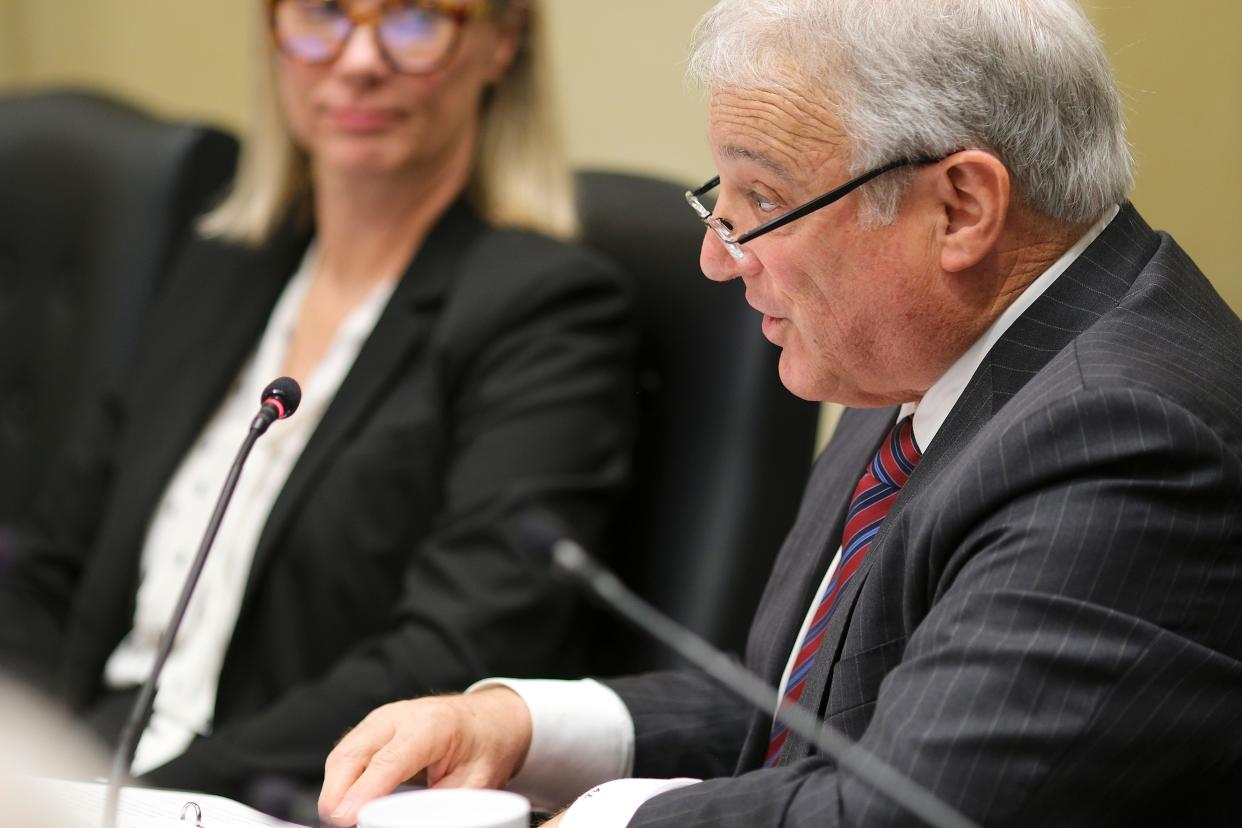Oklahoma's death penalty system is broken, commission tells lawmakers

Oklahoma should return to a moratorium on the death penalty and implement the 46 recommendations made by the Death Penalty Review Commission, a panel of experts told state lawmakers Thursday.
Speaking at a legislative interim hearing on the death penalty, Judge Andy Lester, a member of the commission that examined the state’s death penalty process in 2017, said the state’s capital punishment process is fundamentally flawed.
“From start to finish, Oklahoma’s capital punishment system is badly broken,” Lester said. “We (the commission) all were convinced that Oklahoma is not doing what is necessary to make sure innocent people aren't being sentenced to death in Oklahoma.”
Lester, who previously served as acting general counsel for the Oklahoma House of Representatives and as as chief counsel to Special House Committees investigating public corruption, said the Death Penalty Review Commission issued a 300-page report in 2017, which made 46 recommendations to state lawmakers on how to improve the capital punishment process.
Commission not confident Oklahoma can administer death penalty fairly and humanely
The 11-member commission spent more than a year studying all aspects of the death penalty process. The bipartisan group — chaired by Lester, former Gov. Brad Henry and former Oklahoma Court of Criminal Appeals Judge Rita Strubahr — was composed of five women and six men and included prosecutors, defense attorneys, individuals who have served in state government, law school professors and deans, victims’ advocates and advocates for Native Americans.
Lester said the study of the death penalty left him and the other members of the commission with deep doubts that the state could administer capital punishment fairly and humanely. “We all were convinced that Oklahoma was not doing what was necessary to make sure innocent people aren’t being sentenced to death in Oklahoma,” he said.
More: With Glynn Simmons free, is Carolyn Sue Rogers' 1974 murder now a cold case?
As of today, he said, none of those recommendations have been implemented. Because the system is so flawed, Lester said the state should reinstate a moratorium on all executions.
Richard Glossip case an example of flaws in the system, commissioner says
Lester pointed to recent cases such as the case of Richard Glossip as a major example of flaws in the capital punishment process. Glossip was convicted of the 1997 murder-for-hire of his former boss, Barry Van Treese. Prosecutors said Glossip cut a deal with Justin Sneed to kill Van Treese in Oklahoma City.
In May, the U.S. Supreme Court granted Glossip a stay of execution, pending a decision on his appeal. As of Sept. 27, the high court had not issued a ruling. In June, Attorney General Gentner Drummond said he did not believe Glossip would be executed.
"I think it (Glossip's case) will be remanded back to Oklahoma County for the county to adjudicate it," Drummond said during a meeting of the Oklahoma Press Association. "And if that's the case, I predict it will probably be pled out."
More: Death row inmate Richard Glossip gets execution stay from US Supreme Court
State Rep. Kevin McDugle, R-Broken Arrow, who chaired the death penalty study, praised the commission. “They did tons of work (on the issue),” he said. “But it’s difficult to change things in this building sometimes — though it’s not for a lack of trying.”
In 2021, McDugle authored several pieces of legislation to strengthen the integrity of the state's death penalty process. One of those bills, House Bill 1551, would have created a Conviction Integrity Review Unit within the Oklahoma Pardon and Parole Board to review capital cases where a defendant presented a plausible claim of actual innocence. The measure stalled before making it to the House floor.
McDugle, who also has raised concerns about the Glossip case, told an Oklahoma City TV station this summer he believed there was unethical communication between the Oklahoma District Attorney's Council and the Oklahoma Pardon and Parole Board that resulted in the board, "making decisions on Glossip before we ever had the hearing."
With current system, botched executions are all but guaranteed, former department of corrections director says
While some experts raised issues about how death penalty cases were prosecuted, former Oklahoma Department of Corrections Director Justin Jones predicted there would be more botched executions in Oklahoma. Jones said he oversaw 28 executions as the Corrections Department leader.
“No matter how much fidelity we practice, no matter how many inspections we do, you have an array of employees who are asked to do the ultimate,” Jones said. “And we have some of the lowest paid state employees in government, they sit there and do this: kill someone for the state Oklahoma. I’m guaranteeing you, you’re going to have botched executions as long as you’re doing the (execution) protocols you’re doing.”
District Attorney Jason Hicks, who represents Jefferson, Stephens, Grady and Caddo counties, said he was a strong supporter of the death penalty, adding that those cases get the highest scrutiny in his office. “We are literally talking about the worst of the worst cases,” he said.
Hicks said the only way prosecutors can get a death sentence is to prove extenuating circumstances beyond a reasonable doubt. “There are a lot of people that look at the cases,” he said. Hicks said his office also was transparent with opposing attorneys.
“We don’t play games with discovery; we never have,” he said.
Oklahoma has executed 120 inmates since the death penalty was reinstated in 1976. State lawmakers will return to the Capitol for next regular legislative session in February 2024.
This article originally appeared on Oklahoman: Oklahoma legislators urged to put moratorium on death penalty.

